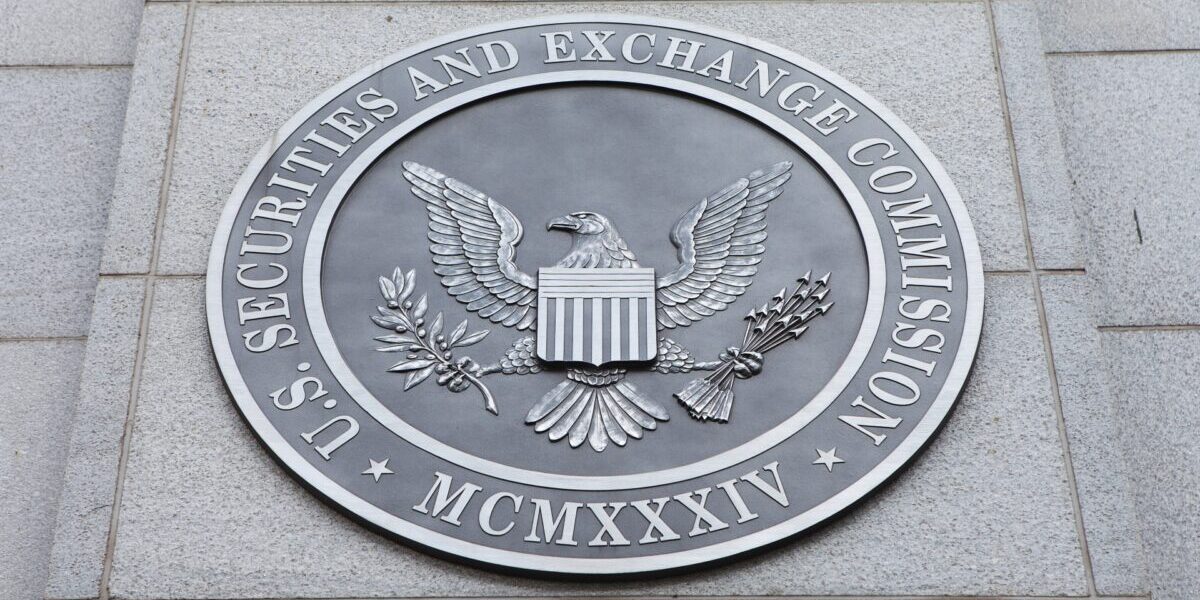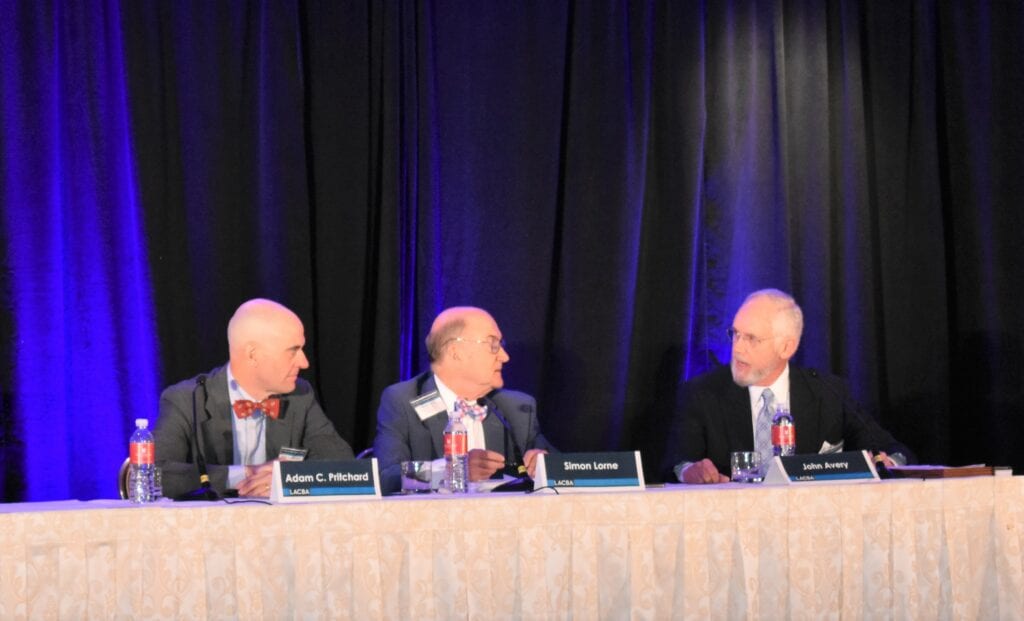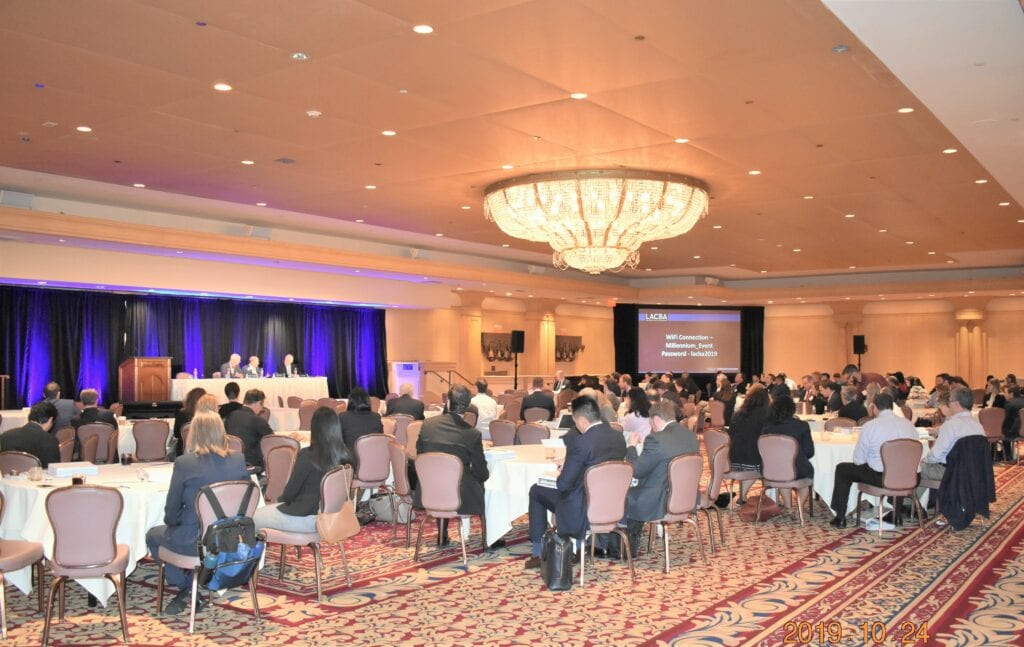Search Posts
Recent Posts
- Do you meet the definition of an “Accredited Investor” under the new SEC Rules? December 8, 2020
- Do You Really Have Time To Read & Understand The Heroes Act? November 23, 2020
- Governor Newsom – Please Order all Court Buildings in the State of California Closed starting March 16 March 15, 2020
- Three Men Arrested in $722 Million Cryptocurrency Fraud Scheme Targeting “Dumb” Investors December 10, 2019
- Should Court Transcripts be Provided to Parties Free of Charge? December 3, 2019
Categories
Subscribe!
Thanks for subscribing! Please check your email for further instructions.

Part 2: Highlights from LACBA’s 52nd Annual Securities Regulation Seminar – Legislative, Regulatory and Legal Developments in Securities Laws
Panel: Legislative, Regulatory and Legal Developments in Securities Laws
This Legislative, Regulatory and Legal Developments in Securities Laws Panel discussed recent developments in securities laws from the U.S. Securities and Exchange Commission (SEC) General Counsel’s perspective, John W. Avery, Deputy Solicitor SEC Office of the General Counsel.
Simon Lorne, Vice Chair, Millennium Management LLC, moderated the panel, and highlighted the lack of legislative activity in this space during the past year. Given that Congress is divided ahead of a presidential election, there will probably not be a lot of activity during the upcoming year. Adam C. Pritchard, Professor, University of Michigan Law School, discussed cases that have and will continue to impact this practice area. The opinions of the panelists are summarized below.

Whistleblowers have to file a complaint with the SEC in order to be eligible for anti-retaliation protection
The U.S. Supreme Court’s (SCOTUS) holding in Digital Realty Trust, Inc. v. Somers (Digital Realty) requiring whistleblowers to report to the SEC first was not a sensible requirement because it undermines the ability of corporations to encourage a whistleblower to report internally first. When the SEC adopted the whistleblower rule, they tried to encourage people to report internally first. However, the SCOTUS focused on the fact that Dodd-Frank’s purpose and design was to motivate people who knew of securities law violations to tell the SEC first. This is why the SCOTUS in Digital Realty held that whistleblowers must tell the SEC first. The panelists agreed that whistleblowers should be protected from retaliation, however, the SCOTUS’s failure to encourage whistleblowers to report internally first obstructs a corporation’s opportunity to resolve the issue at a corporate level. The requirement to tell the SEC when the corporation has not yet had an opportunity to respond may unnecessarily complicate certain situations.

H.R. 2534 – Insider Trading Prohibition Act will probably not become law
The panel discussed H.R. 2534 – Insider Trading Prohibition Act (the Act), which will likely not become law. The Act is currently pending in the House where Democrats and Republicans are wrangling with its language. The Act attempts to remove obstacles that the SEC has faced with respect to the knowledge requirement and personal benefit requirement established by Dirks v. SEC. There is often difficulty in establishing the awareness of the persons in the end of the chain of the breach of fiduciary duty by the insider that disseminated that information. The Act also attempts to make it clear that there are certain other acts within its purview such as the wrongful use of information and breaches of fiduciary duty, whether or not there was knowledge of such use or breach.
The Significance of Regulation Best Interest is Unclear
Regulation Best Interest is getting a lot of attention. While it is technically important, it is not clear how practically important it is especially in California, where court views of fiduciary duties have been relatively expansive.
The Structure of the CFPB may be struck down in an upcoming SCOTUS Case
The SCOTUS granted cert and will hear a challenge to the Consumer Financial Protection Bureau (CFPB) by a firm claiming that the director has too much power. The constitutional law genesis of this issue was described as follows. In a 1935 case Humphrey’s Executor, the SCOTUS rebuked Roosevelt’s efforts to take over the Federal Trade Commission, claiming that the President did not have the power to remove an FTC Commissioner because it was quasi-legislative and quasi-judicial; this is the building block of all agencies. Another SCOTUS case, Morrison v. Olson, held that the Ethics in Government Act of 1978 puts the removal power squarely in the hands of the Executive Branch. In the case of the CFPB, the head is a single director. The Free Enterprise Fund v. Public Company Accounting Oversight Board case was also briefly discussed. Putting the cases together, Adam Pritchard guesses that removal for cause will be going too far and the structure of the CFPB will be struck down. Dodd Frank has a separability clause and the result may be to make the head of the CFPB removable by the President.
Kokesh’s holding harmed the SEC’s ability to seek disgorgement beyond a 5-year statute of limitations
The SEC was harmed by the SCOTUS’s holding in Kokesh v. SEC that 28 U.S.C. §2462 applies to claims for disgorgement imposed as a sanction for violating federal securities. The SEC regularly seeks disgorgement in cases and is now met with the challenge of working within a 5-year statute of limitations. For example, if the court applies a 5-year statute of limitations in the case where fraud stretched back to the 1990s, penalties and disgorgement will only be calculated for conduct within 5 years. The SEC believes that disgorgement is not a penalty or forfeiture, and is therefore not subject to the 5-year statute of limitations. Contrary to this, Kokesh’s application of 28 U.S.C. §2462 means that ill-gotten gains cannot be recovered beyond the 5-year statute of limitations. This is especially problematic because fraud tends to be secretive and not uncovered quickly. After fraudulent conduct is discovered, the SEC’s goal is to recover all the money for the entire duration of the fraud, not just the past 5 years. The SCOTUS went on to explain that disgorgement is a penalty because it is brought by the agency and its goal is to deter, not solely to be returned to injured investors. While the SEC tries to return the funds, it is not always possible and funds that are not returned to harmed investors are deposited in the U.S. Treasury.
Footnote 3 cautioned that “Nothing in this opinion should be interpreted as an opinion on whether courts possess authority to order disgorgement in SEC enforcement proceedings or on whether courts have properly applied disgorgement principles in this context. The sole question presented in this case is whether disgorgement, as applied in SEC enforcement actions, is subject to §2462’s limitations period.”
Following this case, however, some defendants have argued that the SCOTUS’s holding applies beyond the 5-year limitation and that disgorgement is illegal since disgorgement is within the court’s equitable powers.
Lorenzo’s holding expanded the SEC’s ability to pursue broader violations of Rule 10b-5
SCOTUS’s holding in Lorenzo v. SEC (Lorenzo) was great because it expanded the reach of Rule 10b-5, one of the most important rules targeting securities fraud. Lorenzo involved a mid-level investment banker at Charles Vista, LLC, a registered broker-dealer in Staten Island, New York. Lorenzo’s boss directed him to send out an email to retail investors regarding a company developing technology to convert solid waste into clean renewable energy. Lorenzo knowingly sent false and misleading emails pumping up the company and included a gross inflation of its assets of the company. The SEC charged Lorenzo with violations of Rule 10b-5, §10(b) of the Securities Exchange Act of 1934, and §17(a)(1) of the Securities Act of 1933. In the DC circuit, Lorenzo was not deemed a “maker” of the false emails under Rule 10b-5(b) but he was liable under subsections (a) and (c) of Rule 10b-5 which allow the SEC to pursue fraudulent schemes. The court concluded that the dissemination of false and misleading statements was actionable and the SEC has room to pursue broader violations without having to rely on aiding and abetting authority.
One of the panelists then explained that the SCOTUS never talked about the subsections of Rule 10b-5 until Lorenzo and Janus. He went on to explain that Lorenzo obliterates Janus. This further complicates litigation because after Central Bank, Lorenzo and Janus, litigators are in the position of parsing exactly what type of fraud was committed.
Lucia’s holding allows SEC ALJs to continue hearing cases
SCOTUS’s holding in Lucia v. SEC (Lucia) is that the SEC’s Administrative Law Judges (ALJs) are “Officers of the United States,” subject to the Appointments Clause. An ALJ assigned to hear an SEC enforcement action has extensive powers – the “authority to do all things necessary and appropriate to discharge his or her duties” and ensure a “fair and orderly” adversarial proceeding.
Lucia brought up concerns in administrative agencies generally because it seemed to undermine a lot of what the SEC had done with respect to ALJs. Cases that had been paused were then restarted before a different ALJ. Today, defendants argue that since ALJs are officers, it raises issues of whether they were unconstitutionally appointed. There are arguments that make the removal of ALJs constitutional.
My favorite quote of the day is “you need to listen not just to the words, but also the music,” Harvey Pitt, former SEC Chairman.
Please email me with questions or leave a comment below!
https://waterfallmagazine.com
A person essentially help to make significantly posts I’d state.
This is the first time I frequented your website page and thus far?
I surprised with the research you made to make this actual submit extraordinary.
Magnificent activity!
Thanks for stopping by!